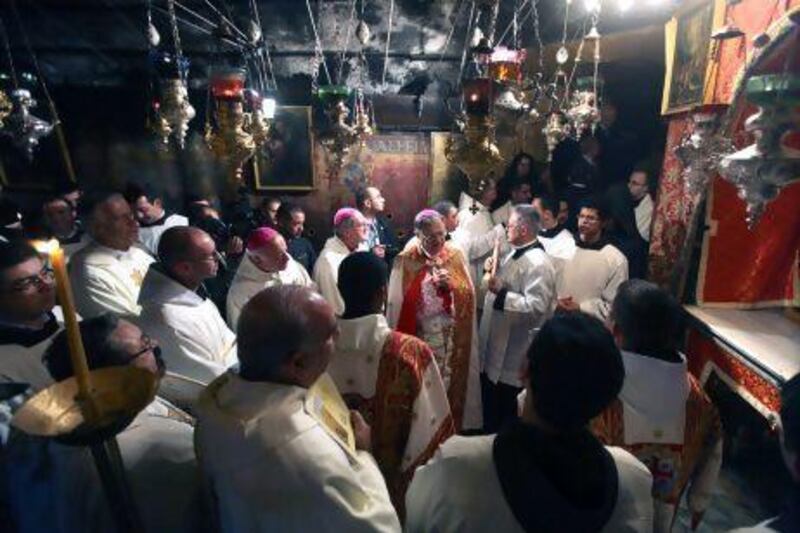VATICAN CITY // Pope Benedict XVI wished Christmas peace to the world yesterday, decrying the slaughter of the "defenceless" in Syria and urging Israelis and Palestinians to find the courage to negotiate.
Delivering the Vatican's traditional Christmas day message from the central balcony of St Peter's Basilica, Pope Benedict also encouraged Arab Spring nations, especially Egypt, to build just and respectful societies.
He prayed that China's new leaders respect religion, a reference to persecution Chinese Roman Catholics have at times endured under communism.
As the 85-year-old pontiff, bundled up in an ermine-trimmed red cape, gingerly stepped foot on the balcony, the pilgrims, tourists and Romans below backing St Peter's Square erupted in cheers.
Less than 12 hours earlier, Pope Benedict had led a two-hour long Christmas Eve ceremony in the basilica. He sounded hoarse and looked weary as he read his Christmas message and then holiday greetings in 65 languages.
In his "Urbi et Orbi" speech, which traditionally reviews world events and global challenges, the pope prayed that "peace spring up for the people of Syria, deeply wounded and divided by a conflict that does not spare even the defenceless and reaps innocent victims".
He called for easier access to help refugees and for "dialogue in the pursuit of a political solution to the conflict".
Pope Benedict prayed that God "grant Israelis and Palestinians courage to end long years of conflict and division, and to embark resolutely on the path to negotiation".
The senior Palestinian official Saeb Erekat said that in a meeting with the pope last week, Palestinian Authority president, Mahmoud Abbas, "emphasised our total readiness to resume negotiations". The Palestinians have not dropped their demand that Israel first stop settlement activities before returning to the negotiating table.
Hours earlier, in the ancient Bethlehem church built over the site where tradition holds Jesus was born, candles illuminated the sacred site and the joyous sound of prayer filled its overflowing halls.
Bethlehem lies 10 kilometres south of Jerusalem. Entry to the city is controlled by Israel, which occupied the West Bank in 1967.
For those who couldn't fit into the cavernous Bethlehem church, a loudspeaker outside broadcast the Christmas day service to hundreds of faithful in the square.
Their Palestinian hosts, who welcome this holiday as the high point of their city's year, were especially joyous this season, proud of the United Nations' recognition of an independent state of Palestine just last month.
"From this holy place, I invite politicians and men of good will to work with determination for peace and reconciliation that encompasses Palestine and Israel in the midst of all the suffering in the Middle East," said the top Roman Catholic cleric in the Holy Land, Latin Patriarch Fouad Twal in his annual address.
At the Vatican, Pope Benedict offered encouragement to countries after the Arab Spring of democracy protests. He had a special word for Egypt, "blessed by the childhood of Jesus".
He urged the North African region to build societies "founded on justice and respect for the dignity of every person".
Benedict prayed for the return of peace in Mali and harmony in Nigeria, where, he recalled "savage acts of terrorism continue to reap victims, particularly among Christians".
The Vatican for decades has been worried about the well-being of its flock in China, who are loyal to the pope in defiance of the communist's government support of an officially sponsored church, and relations between Beijing and the Holy See are often tense.
Speaking about China's newly installed regime leaders, Benedict expressed hope that "they will esteem the contribution of the religions, in respect for each other, in such a way that they can help to build a fraternal society for the benefit of that noble people and of the whole world".





